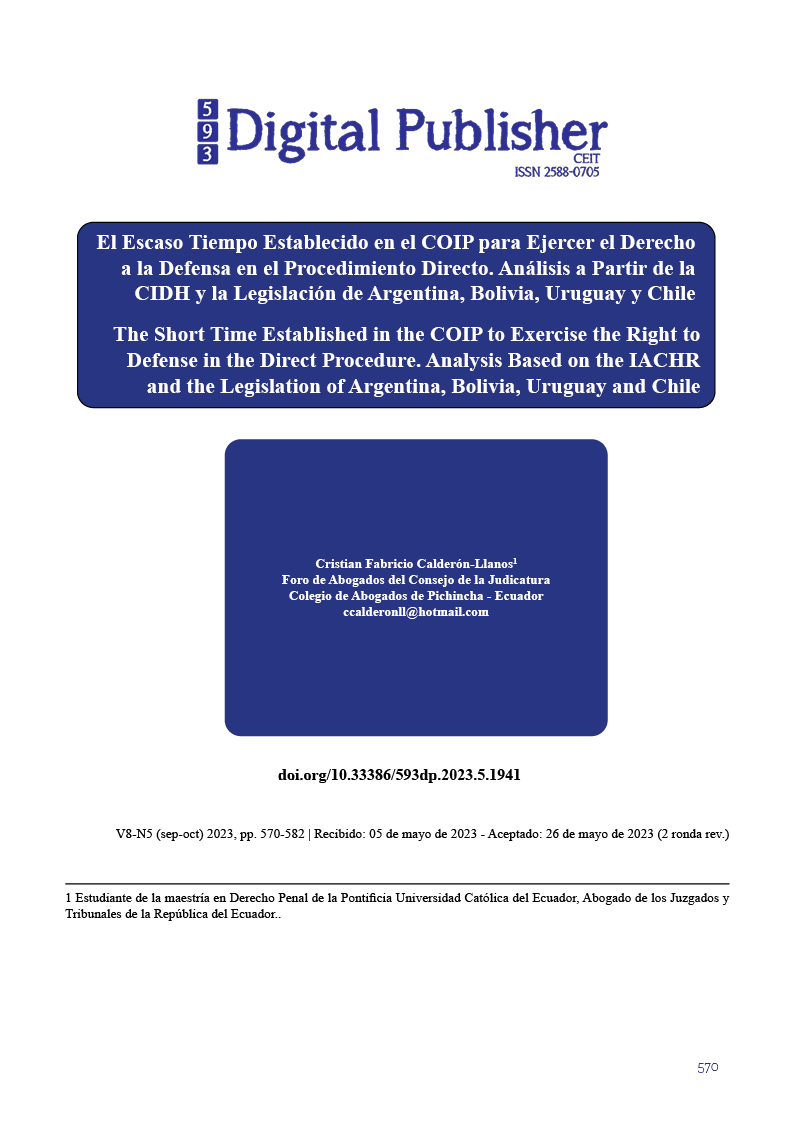The Short Time Established in the COIP to Exercise the Right to Defense in the Direct Procedure. Analysis Based on the IACHR and the Legislation of Argentina, Bolivia, Uruguay and Chile.
Main Article Content
Abstract
This article generates an analysis of the right to defense when applying the Direct Procedure, established in the Organic Integral Criminal Code in its article 640, referring to the limited time that exists in Ecuadorian legislation for the collection and presentation of evidentiary material, from the flagrante delicto hearing to the trial hearing. the same that contemplates only twenty days which is insufficient, taking into account that three days before the trial hearing the evidence to be used must be announced, others if it is considered Saturdays, Sundays, holidays and the delay of the dispatch of evidence of the requests to the Prosecutor's Office due to the procedural burden that rests in this institution, It is observed that there is a serious problem in this type of procedure, which leads to the impairment of the right to defense, since this time is further reduced. The methodology applied was of an inductive deductive type that allowed analyzing the characteristics of this procedure and the importance of the right to defense, in addition to the documentary analysis since it resorted to the study of several judgments of the Inter-American Court of Human Rights strictly verifying a short time to exercise an effective defense. Finally, using the comparative method made it possible to carry out a study of the legislation of Argentina, Bolivia, Uruguay and Chile with the Ecuadorian penal norm, which have procedures similar to the direct procedure.
Downloads
Article Details

This work is licensed under a Creative Commons Attribution-NonCommercial-ShareAlike 4.0 International License.
1. Derechos de autor
Las obras que se publican en 593 Digital Publisher CEIT están sujetas a los siguientes términos:
1.1. 593 Digital Publisher CEIT, conserva los derechos patrimoniales (copyright) de las obras publicadas, favorece y permite la reutilización de las mismas bajo la licencia Licencia Creative Commons 4.0 de Reconocimiento-NoComercial-CompartirIgual 4.0, por lo cual se pueden copiar, usar, difundir, transmitir y exponer públicamente, siempre que:
1.1.a. Se cite la autoría y fuente original de su publicación (revista, editorial, URL).
1.1.b. No se usen para fines comerciales u onerosos.
1.1.c. Se mencione la existencia y especificaciones de esta licencia de uso.
References
Caso Cantoral Benavides Vs. Perú (Corte Interamericana de Derechos Humanos 18 de agosto de 2020).
Caso Castillo Petruzzi y otros Vs. Perú (Corte Interamericana de Derechos Humanos 30 de mayo de 1999).
Caso Fermín Ramírez Vs. Guatemala, Caso Fermín Ramírez Vs. Guatemala (Corte Interamericana de Derechos Humanos 20 de junio de 2005).
Caso Suarez Rosero Vs. Ecuador (Corte Interamericana de Derechos Humanos 12 de noviembre de 1997).
Caso Suárez Rosero Vs. Ecuador (Corte Interamericana de Derechos Humanos 12 de noviembre de 1997).
Caso Tibi Vs. Ecuador, Caso Tibi Vs. Ecuador (Corte Interamericana de Derechos Humanos 07 de septiembre de 2004).
Cavallo, G. A. (2014). El control de convencionalidad: análisis en derecho comparado. Rev. direito GV 9 (2), 1.
Chile, C. N. (10 de abril de 2023). Biblioteca del Congreso Nacional de Chile. Biblioteca del Congreso Nacional de Chile: https://www.bcn.cl/leychile/navegar?idNorma=176595
Chiluisa, L. d. (2021). El Control de Convencionalidad frente al Control Concentrado Constitucional en El Ecuador . Revista de derecho UNED, 80.
Constituyente, A. N. (2008). Constitución de la República del Ecuador. En A. N. Constituyente, Constitución de la República del Ecuador (pág. 30). Quito: Corporación de Estudios y Publicaciones.
Ecuador, A. N. (2022). Código Orgánico Integral Penal. En Asamblea Nacional del Ecudor, Código Orgánico Integral Penal (pág. 193). Quito: Corporación de Estudios y Publicaciones.
Humanos, C. A. (1969). Pacto de San José. (pág. 3). San Josè de Costa Rica: Lexis Finder.
Humanos, C. I. (31 de enero de 2011). Caso del Tribunal Constitucional Vs. Perú. Perú: https://www.corteidh.or.cr/docs/casos/articulos/seriec_71_esp.pdf
Internacional, C. P. (1998). Estatuto de Roma. En C. P. Internacional, Estatuto de Roma (págs. 46,47). Roma: Corte Penal Internacional 2021.
Internacional, S. I. (2010). Grupo Latinoamericano de Estudios sobre el Derecho Penal Internacional. Montevideo: Gisela Elsner. Grupo Latinoamericano de Estudios sobre el Derecho Penal Internacional: https://ssrn.com/abstract=2435131
Kostenwein. (17 de 10 de 2017). Estudios socio - Jurídicos. El proceso de flagrancia desde la sociología de la justicia penal: http://dx.doi.org/10.12804/revistas.urosario.edu.
Laura Alicia Camarillo Govea, E. N. (2016). El control de convencionalidad como consecuencia de las decisiones judiciales de la Corte Interamericana de Derechos. Revista IIDH, 6.
Ministerio de Justicia, D. G. (10 de septiembre de 2010). Código Penal y Código de Procedimiento Penal. https://tsj.bo/wp-content/uploads/2019/11/codigo-penal-y-procedimento-penal.pdf
Nación, M. P. (07 de 02 de 2019). Procedimiento en Flagrancia. Ministerio Público Fiscal: https://www.mpf.gob.ar/cppf/files/2019/06/CPPF_SistemaAcusatorio.pdf
Noguera Alcalá, H. (2012). LOS DESAFÍOS DEL CONTROL DE CONVENCIONALIDAD FRENTE AL CONTROL CONCENTRADO CONSTITUCIONAL EN EL ECUADOR. UNED. Revista de Derecho Político, 335.
Oficial, C. d. (09 de 01 de 2016). Normativa y Avisos Legales del Uruguay. Normativa y Avisos Legales del Uruguay: https://www.impo.com.uy/bases/codigo-proceso-penal-2017/19293-2014?verreferencias=norma
Ramírez, G. A. (2021). Vulneración del derecho a la defensa en el procedimiento directo. Revista Científica Dominio de las Ciencias, 8(1), 669.
Sarmineto, D. J. (2021). Daniel Jesús Sarmineto y el plazo razonable como garantía de un proceso judicial. En D. J. Sarmineto, Daniel Jesús Sarmineto y el plazo razonable como garantía de un proceso judicial (pág. 1). Barcelona: Comunicae Newswire, Spain.
Unidas, A. G. (1948). Declaración Universal de los Derechos Humanos. En A. G. Unidas, Declaración Universal de los Derechos Humanos (pág. 3). París: Lexis.
Viñas, M. H. (2019). La naturaleza del control interno de convencionalidad y su disímil recepción en la jurisprudencia de las cortes chilenas. Revista del Derecho del Estado, 136.


